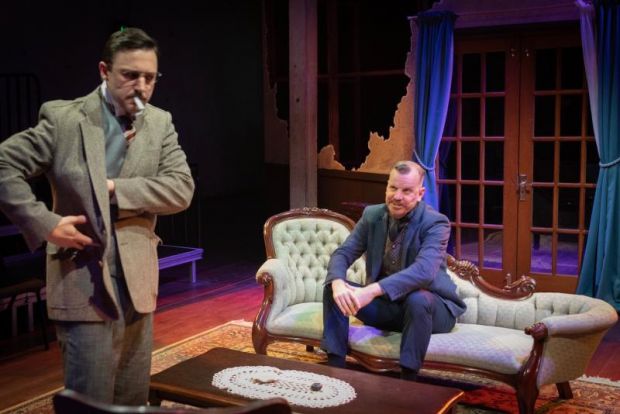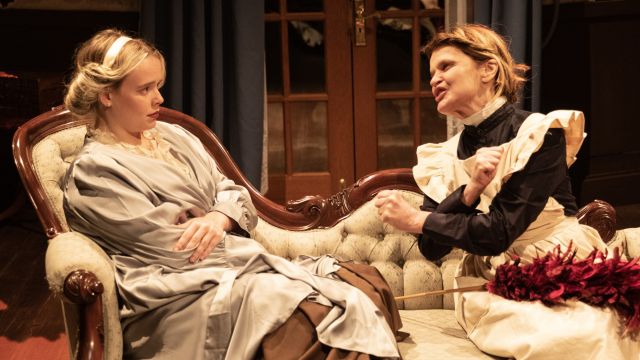Exiles
James Joyce’s Exiles is his only play. Written in 1915, it failed to get a production in Ireland or Britain. That may have been due to Joyce’s ‘revolutionary’ ideas about love and marriage – or possibly that it was felt that it was not up to the theatrical standards of Bernard Shaw or Joyce’s predecessor Henrik Ibsen - whom Joyce admired. But perhaps Exiles was a sort of experiment, written at a time when cash-strapped Joyce was writing poetry, criticism and his now famous short stories. It received its first professional production in English by Harold Pinter in 1970 – to mixed responses.
The exiles of the title are writer Richard Rowan (Doug Lyons) and ‘wife’ Bertha (Lucy Payne) who return to Dublin from Rome after a nine-year absence with their son, ten-year-old Archie (Caithlin O’Loghlen). Richard’s best friend, journalist Robert Hand (Soren Jensen), admires Richard and helps to get him an academic appointment - while at the same time trying to seduce Bertha.

A further wrinkle is Archie’s piano teacher Beatrice Justice (Mary-Agnes O’Loughlin) with whom Richard has been corresponding while in Rome, and who is an inspiration for his writing. Richard claims to be a proponent of ‘freedom’ – or what we might call today ‘open marriage’ – but he is a manipulative and self-righteous fellow who has kept Beatrice on a string all this time and is thrown into an icy jealous rage when he learns of his friend Robert’s attempts to seduce Bertha… Bertha, meanwhile, the best gameplayer of all of them, enjoys Robert’s attention and is wearied by her husband’s verbose and evasive speeches.
In this mix of ambivalence and ambiguity, Archie is oblivious, of course) and only the Rowan’s maid Brigid (Linda Cookson) seems to know just what is going on – providing some nice comic touches as she lets the others and us know that she knows just what is going on.

The production of this difficult ‘problem play’ text is somewhat marred by uneven acting styles among the cast. Mary-Agnes O’Loughlin is moving as a woman simmering with rage at Richard’s behaviour but unfortunately is almost inaudible in the first act. Soren Jensen, on the other hand, shouts too much and his diction is at times unclear, but he gets the emotions right and proves himself adept at the play’s attempts at comedy. Some intervention by director Carl Whiteside could have remedied these things. Doug Lyons has presence and hero looks but gives us a Richard perhaps too much one-note as the buttoned-up having-his-cake-and-eating-it-too intellectual. Lucy Payne plays her ambivalences well throughout, makes us care about her Bertha, and is quite delightful when she reveals a flirtatious teasing side in the second act – making the crucial doubtful ending all the stronger.

Exiles, while psychologically acute (like the Dubliners stories), and the emotions just as real now, it lacks the passion of Joyce’s influence Ibsen or the lively clash of ideas of Shaw. Its real subject is, in fact, jealousy and betrayal; there is no antagonist proposing, for instance, the virtues of conventional marriage. The conflicts are all within the bounds of fidelity versus freedom, friendship versus betrayal. The outside world of Catholic Ireland in 1915 scarcely exists. Perhaps Joyce was working something out about these issues for himself. The result is at times overwritten, although naturally of great historical interest to Joyce aficionados. And Joyce himself went on from this ultimately quite conventional play to the ground-breaking novels Ulysses and Finnegan’s Wake.
Michael Brindley
Photographer: Jody Jane Stitt
Subscribe to our E-Newsletter, buy our latest print edition or find a Performing Arts book at Book Nook.

